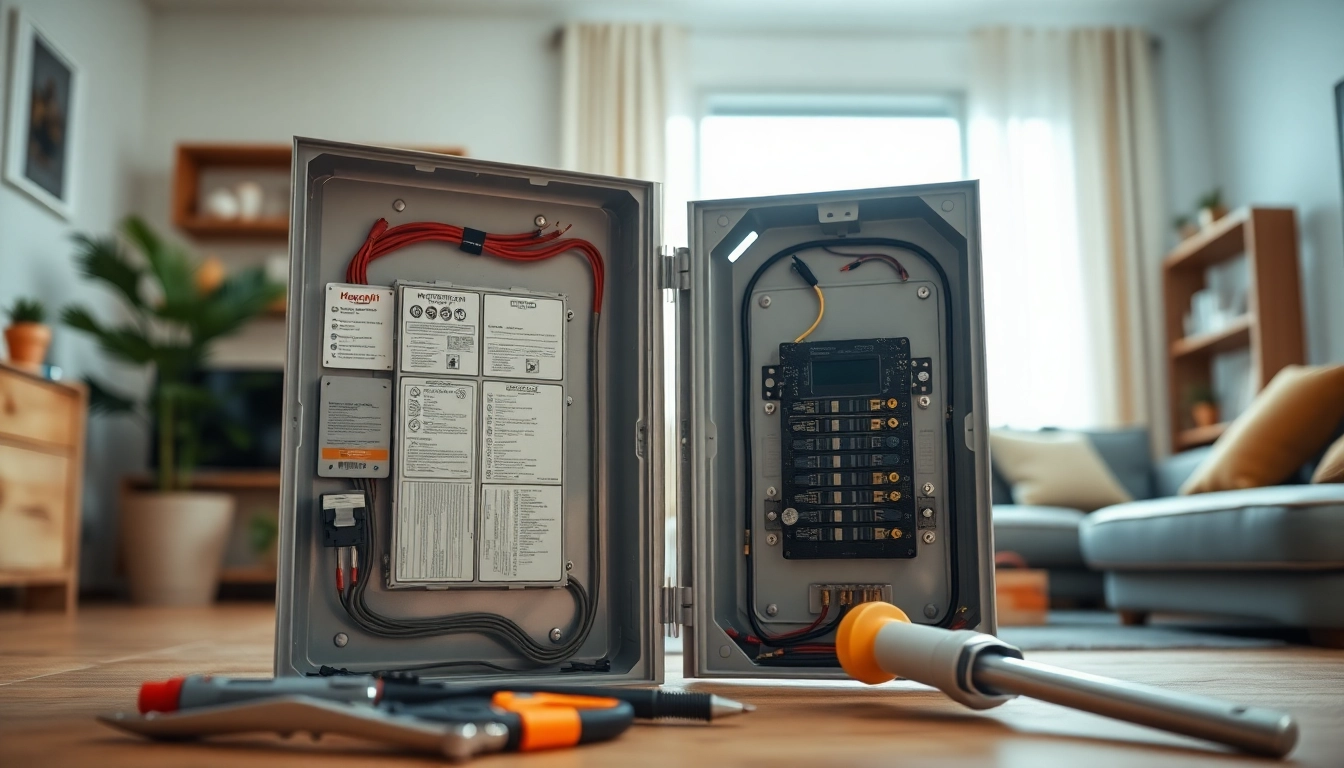Understanding the Importance of Your Electrical Panel
The electrical panel serves as the nerve center of your home’s electrical system, acting as the primary distribution point for electrical power from the utility company. When you flick a switch, plug in a device, or turn on an appliance, the electrical panel controls the flow of electricity to ensure everything runs smoothly and safely. Understanding the importance of your Electrical Panel is essential for homeowners, especially when considering potential upgrades or replacements.
What is an Electrical Panel?
An electrical panel, often referred to as a circuit breaker box, is a metal box that houses circuit breakers or fuses. It is designed to distribute electricity from the main supply line to various circuits throughout the home. Inside the panel, circuit breakers act as switches that automatically cut off the electrical supply when there’s a fault, preventing overloads and potential electrical fires. In sum, it facilitates safe and efficient power distribution while providing necessary protection against dangerous electrical conditions.
The Role of Electrical Panels in Your Home
The electrical panel plays a fundamental role in managing electrical supply within a home. All electrical installations—lighting, appliances, and outlets—connect back to this central hub. Key functions include:
- Power Distribution: It distributes power from the service line to various circuits, allowing different areas of the home to draw electricity as needed.
- Energy Regulation: The panel regulates the amount of electricity that flows to each circuit, managing demand and preventing overload.
- Safety Mechanisms: Circuit breakers or fuses interrupt power in case of faults, protecting appliances and reducing the risk of electrical fires.
Common Types of Electrical Panels
There are several types of electrical panels available, each with distinct features and capacities. Understanding these types can inform your decision should you choose to upgrade:
- Standard Service Panels: The most common type, typically ranging from 100 to 200 amps, this panel suits most residential needs.
- Main Breaker Panels: Centralized systems that enhance electrical load management by providing a primary shut-off for the entire house.
- Subpanels: Smaller panels installed to extend the electrical capacity of the home, often used for detached garages, basements, or additional circuits.
- Load Centers: Designed specifically for residential power distribution, load centers are tested for safety and durability.
Signs That Indicate You Need to Upgrade Your Electrical Panel
Monitoring the condition and performance of your electrical panel is crucial in ensuring safety and efficiency. Below are several signs that may indicate it’s time for an upgrade:
Frequent Circuit Breaker Trips
If you notice that your circuit breakers are frequently tripping, this may indicate that your electrical system is overloaded. Each breaker is designed to handle a specific load, and consistent tripping suggests that your panel may not be able to handle the cumulative demand of all connected appliances and devices. It could also signal that the breakers themselves are faulty or that there are wiring issues.
Inadequate Power Supply for Modern Devices
Today’s homes often contain numerous power-hungry devices, from smart TVs to gaming consoles and home office equipment. If you often find yourself using extension cords or experiencing dim lighting when multiple devices are in use, your electrical panel might not be providing sufficient power. Upgrading to a higher amperage panel can accommodate the growing demands of modern technology.
Visible Wear and Tear
Physical signs of damage to your electrical panel, such as rust, burn marks, or melted wires, are serious red flags. These indicate a potential safety hazard and necessitate immediate inspection by a qualified electrician. Over time, even well-functioning panels can deteriorate, leading to serious risks like electrical fires.
The Benefits of Upgrading Your Electrical Panel
Upgrading your electrical panel can yield numerous benefits that enhance the safety, efficiency, and value of your home. Here are some key advantages:
Improved Safety Features
Modern electrical panels come equipped with advanced safety features, such as ground fault circuit interrupters (GFCIs) and arc fault circuit interrupters (AFCIs), which prevent electrocution and electrical fires, respectively. These updated safety mechanisms significantly reduce risks associated with electrical hazards, offering peace of mind for homeowners.
Increased Energy Efficiency
New panels not only better handle increased electrical loads but also improve energy management. Modern equipment is often designed to optimize energy consumption, leading to lower utility bills. Furthermore, a well-functioning electrical panel contributes to reducing peak demand costs associated with overloading and downtime.
Enhanced Home Resale Value
When it comes to selling your home, having an upgraded electrical panel can make your property more attractive to potential buyers. Many buyers are wary of homes with outdated electrical systems, which might lead to costly renovations. An upgraded panel signifies that the electrical system is current and capable of handling modern demands, providing added confidence for prospective homeowners.
How to Select the Right Electrical Panel for Your Home
Choosing the right electrical panel requires careful consideration of several factors, including capacity, compliance with regulations, and professional installation. Here’s a detailed guide to help you through the selection process:
Choosing the Right Amp Rating
Your panel’s amp rating should reflect your current and anticipated power needs. Most homes are equipped with 100 or 200 amp panels, but larger homes or those with extensive electrical installations may require 400 amps. Assess your daily power usage and consider future expansions to determine the most suitable rating.
Understanding Local Codes and Regulations
Electrical installations must comply with local building codes and regulations. Familiarize yourself with these requirements before purchasing or upgrading your electrical panel. Doing so can prevent costly fines or complications during installation and inspections. Enlisting the help of a qualified electrician familiar with local codes can ensure compliance and a smoother installation process.
Hiring a Qualified Electrician
Upgrading an electrical panel is not a DIY project. It’s vital to hire a licensed and experienced electrician for both safety and effectiveness. They can assess your needs, recommend the suitable panel, handle the installation correctly, and ensure that all local codes are adhered to. Additionally, a knowledgeable electrician will help troubleshoot and resolve any issues that arise during the installation.
Cost Considerations for Upgrading Your Electrical Panel
The costs associated with upgrading your electrical panel can vary significantly based on several factors. Here are key considerations to keep in mind:
Factors Influencing Installation Costs
The total cost of upgrading an electrical panel can be influenced by various factors, including:
- Panel Type: The cost of the panel itself can vary, with more advanced models typically requiring a larger investment.
- Installation Complexity: If extensive rewiring or modification is necessary to accommodate the new panel, installation costs may increase.
- Geographical Area: Labor rates can vary by region, impacting overall costs.
Emergency vs Planned Upgrades
If you’re facing an emergency situation—like a breaker failure—expect higher costs primarily due to urgent labor and potentially expedited parts. Planning an upgrade proactively, on the other hand, allows for better budgeting and the ability to shop for competitive pricing.
Long-term Savings from an Efficient Panel
While the initial investment in a new electrical panel may be significant, consider the long-term savings associated with increased energy efficiency and fewer maintenance costs. An efficient system minimizes electrical waste and reduces your monthly utility bills, helping the initial expenditure quickly pay for itself over time.



